Who is Priscilla Presley, really? What lies behind her idolized image as a soft-spoken beauty queen and glamorous wife to the king of rock? By pulling back the curtain on the icon, Priscilla — the newly released film directed by Sofia Coppola — tells the story of a lonely young girl who gets pulled into the turbulent world of fame.
She suffers in silence, but her changing style narrates her story.
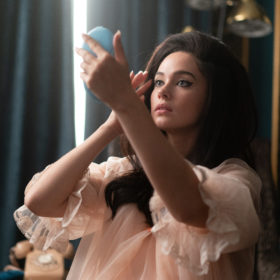
Inspired by Priscilla Presley’s 1985 memoir Elvis and Me, the film spans 13 years: from the day she met Elvis in 1959 to the moment she left him in 1972. The costuming, done by Stacey Battat, drastically changes to coincide with her journey from a teenage fan girl to a struggling housewife.
Priscilla first meets Elvis
The titular character (played by Cailee Spaeny) is introduced as a typical 1950s teen. A 14-year-old Army brat in Germany, she wears full skirts with buttoned-up cardigans and styles her brown hair in a girlish ponytail.
Following the trends of the time, Priscilla seems to blend into the background, like an adolescent who has yet begun the journey of self-discovery. This is who she is when she meets a 24-year-old deployed Elvis (Jacob Elordi) at a party.
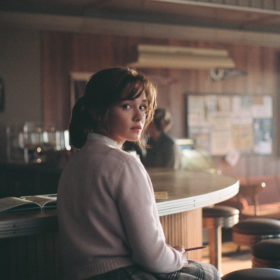
From the start, Priscilla highlights the controversial 10-year age gap between Elvis and Priscilla Presley. Elordi’s Elvis is dramatically taller than Priscilla, towering over her in each scene and reinforcing their power imbalance. At their first encounter, she is a sheepish ninth-grader and he is a world-famous rock singer. And as the relationship progresses, her look begins to fit his vision.
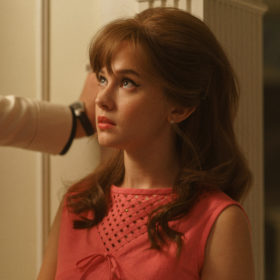
Priscilla moves into Graceland
After moving into Elvis’s Memphis estate at age 17, Priscilla undergoes an evolution that is micro-managed and closely supervised. Here, Elvis signs off on every aspect of her life, including her clothes.
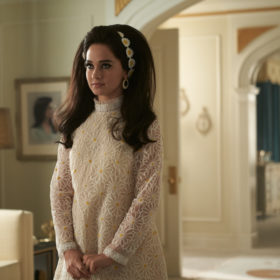
In one shopping spree scene, Elvis — always surrounded by a posse of male pals — doles out his disdain or approval for each item a teenage Priscilla tries on. He declares that blue is her colour. He doesn’t like any shade of brown, he hates prints, and he disapproves of oversized silhouettes. As such, her wardrobe becomes a personally-tailored reflection of his tastes — comprising pastel shift dresses, solid separates, and bow-adorned accents.
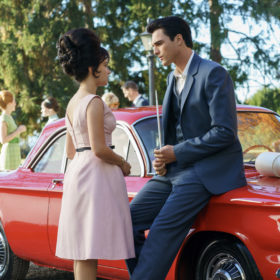
Per his instruction, her hair gets darker and bigger and her makeup becomes bolder. With these notable changes, her formative teenage years are centred not on becoming herself, but becoming Mrs. Elvis Presley. She crafts a commitment to unwavering glamour — with her even rushing to apply false lashes as she’s going into labour.
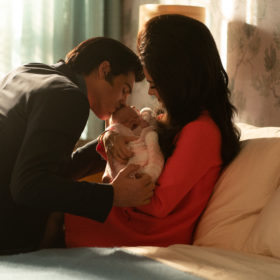
The rigid expectations of her wardrobe spill into every aspect of her life. While Elvis travels for months at a time, she’s expected to stay at Graceland, to not have a job and to not invite people over. She finds herself wrapped up in a culture of substance abuse and unpredictable outbursts. She’s even scolded for so much as playing with her dog in the front yard, where paparazzi could get a glimpse of her.
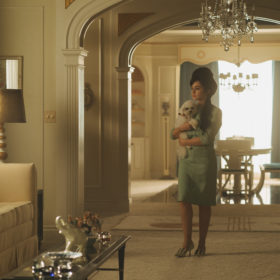
The small moments in which she tries to assert independence and challenge Elvis — by confronting him on a suspected affair or simply saying “I don’t know if I like it” about a demo track — he becomes domineering and physically intimidating; reminding her who’s really in charge. Through it all, her wardrobe rotation of pastels and feminine silhouettes work to appease his standards for docile femininity.
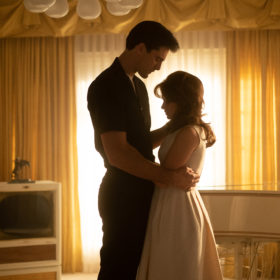
How Priscilla Presley rebels
Over time, however, she pushes back on this rule in small sartorial ways. In one instance, she snaps at him after he criticizes a patterned dress that she’s wearing. And when she realizes he’s having an affair with his co-star in Los Angeles, she flies out to surprise him sporting a non-Elvis-approved print-festooned ensemble. These outfit objections become harbingers for her taking charge of her life.
@a24 No prints. #PriscillaMovie is now playing everywhere
As the distance between her and Elvis grows, she starts to assert dominance in more obvious ways. She takes up karate, cultivates her own friendships and begins favouring pants and prints. In one scene, which recreates a famous 1970 Presley family portrait, her appearance is unmistakably at odds with her husband.
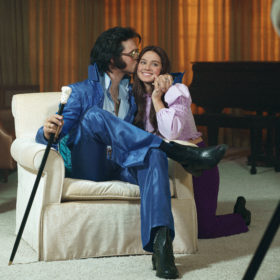
Priscilla is pared-down — trading her signature tall bouffant for loose curls, wearing slacks instead of skirts and swapping her dramatic cat-eye makeup for a swipe of mascara. Elvis, in contrast, embodies over-the-top theatricality, with trailing sideburns, thick glasses, and a gaudy cane. Taken shortly before their divorce, the disconnection in their styling signals their relationship wreckage.
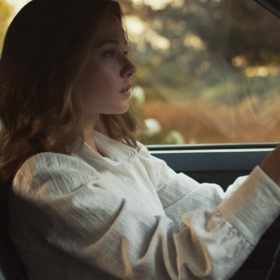
Priscilla Presley leaves Elvis
When departing Graceland for good, Priscilla is wearing a white collared button-up shirt and tailored trousers. It’s her most masculine ensemble yet — and that’s intentional. “I wanted her to feel authoritative, like she was a woman who knew what she was doing,” Battat told The Cut. “It feels like she is making the decisions now.”
As she drives off in this professional uniform, the film ends with much left unanswered. It doesn’t tie-up the story in a neat bow or guarantee that all will be well. But it does, through its styling subtleties, suggest that Priscilla Presley can finally explore who she is. After all, as much as clothing might control you, it can also set you free.
This article contains affiliate links, so we may earn a small commission when you make a purchase through links on our site at no additional cost to you.
The post In <Em>Priscilla</Em>, Makeup and Clothing Are Control appeared first on FASHION Magazine.
